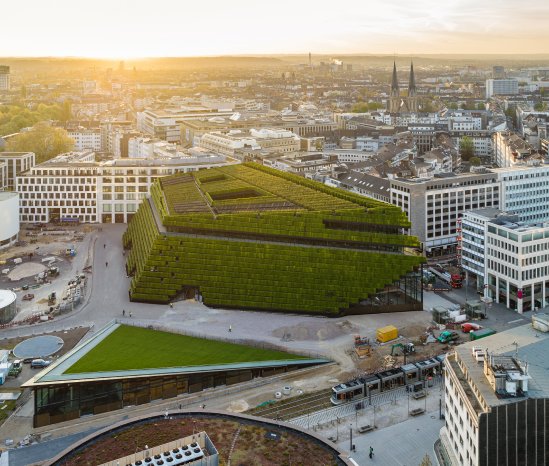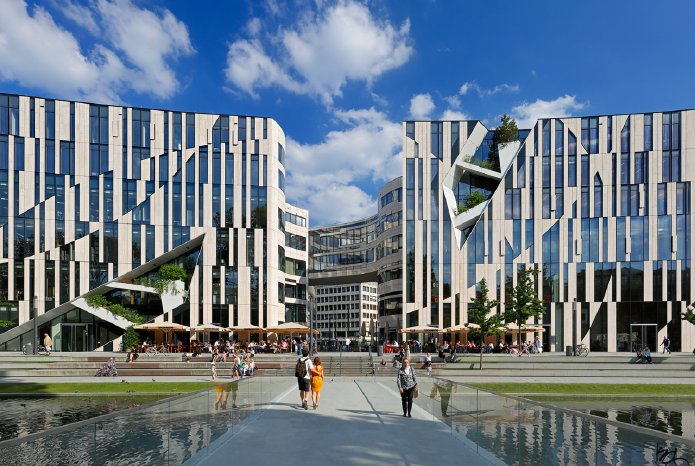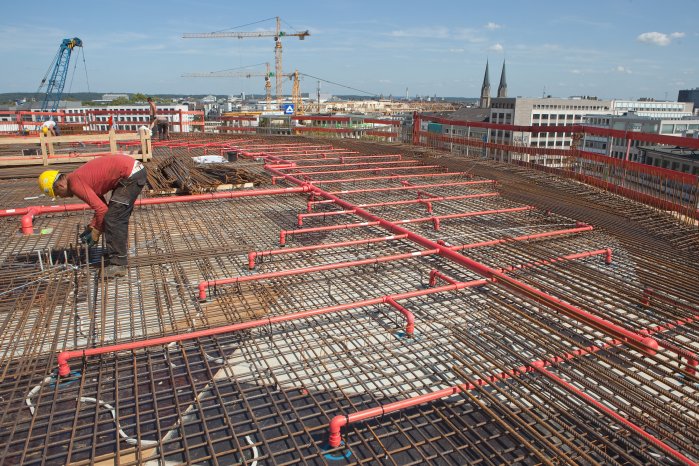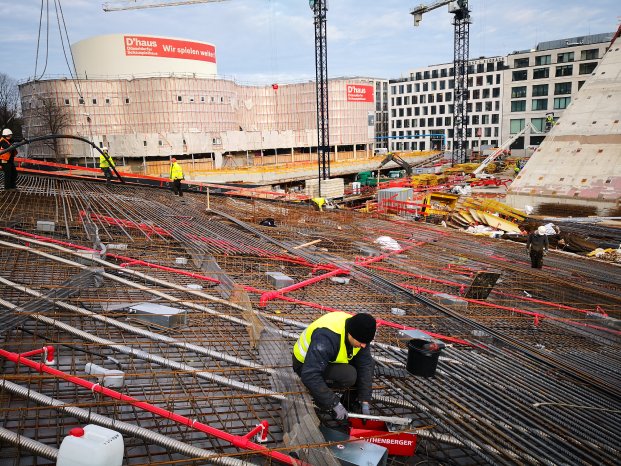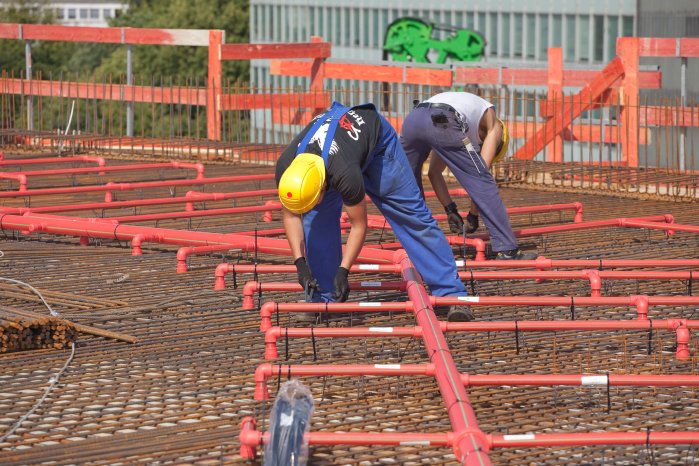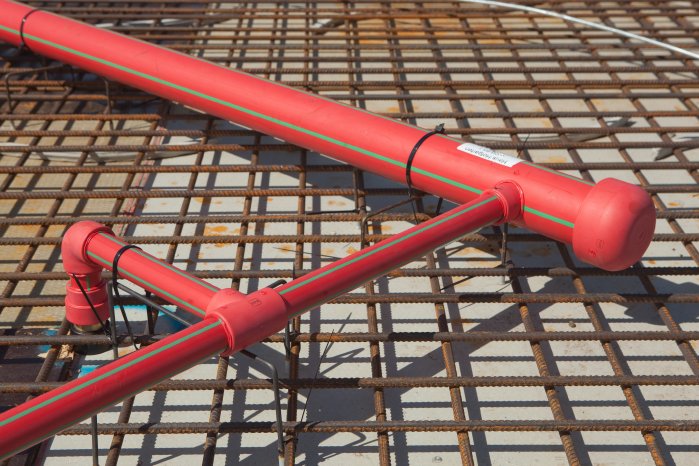The Kö-Bogen I by star architect Daniel Libeskind has become a landmark in the heart of Düsseldorf (Germany). Behind its facade of glass and white natural stone, which is broken up with diagonal cuts, or "cuts," is a mix of high-quality shopping, gastronomy and office space. Two 26meter-high buildings offer a floor area of approximately 42,000 m². Due to its sustainable construction, Kö-Bogen I has received LEED Platinum certification.
The adjacent Kö-Bogen II - called KII - is no less impressive: Designed by Düsseldorf-based architects Ingenhoven, the building with retail and office space also stands out with its unusual facade. 30,000 hornbeam hedges form Europe's largest green facade, thus reducing the building's carbon footprint - an exemplary response to the challenges of climate change. This is because the greenery reduces thermal radiation, stores moisture and reduces ambient noise. It also absorbs as much CO2 as 80 deciduous trees can. The adjacent triangular "food court," which houses the catering facilities, features a walkable turf roof. This sustainable roof invites visitors to linger in good weather and is a popular meeting place for all visitors.
Convincing safety
Both buildings not only impress with their architecture, but also offers its users the highest level of safety in terms of fire protection. Kö-Bogen I received the "Sprinkler Protected" seal of approval from the German Fire Protection Association (bvfa) for its comprehensive fire protection measures. On three floors, the sprinklers are connected with the piping system aquatherm red pipe, which was laid invisibly in the concrete of the floor ceilings. According to the customer, aquatherm prefabricated all necessary line and supply pipes. This eliminated the need for numerous welds on site, saving not only a lot of time but also manpower. Also, the tightness test had already taken place in the aquatherm factory in Attendorn in the south of Westphalia, enabling the pipes to be delivered to Düsseldorf ready for installation. In concrete terms, around 3,400 sprinkler connections and 6,500 meters of pipe including fittings were installed in 25 construction stages.
Unlike metal systems, the piping system aquatherm red pipe is welded into a homogeneous, materially bonded, and thus safe unit thanks to fusion. In the process, the pipe and fitting are briefly heated using tools provided for this purpose and then simply joined together.
The fire protection system proven in Kö-Bogen I was also used in the "food court" of KII. A particular challenge here was the exposed concrete ceiling designed by the architect. "The architect's wish was to install the sprinkler system directly in concrete. This would not have been possible with a metallic system. With aquatherm red pipe we got a discreet sprinkler solution in a visually beautiful exposed concrete ceiling for the representative entrance area," explains Jannis Windmüller, project manager fire extinguishing system construction at ARASTI Feuerschutzanlagen GmbH & Co. KG in Essen.
Laying directly in concrete
The laying directly in concrete is made possible by the special material of aquatherm red pipe: the plastic polypropylene, specifically the material fusiolen® PP-R FS developed by aquatherm. It is not only flame retardant (building material class B1), but also corrosion resistant. For comparison: When using metal sprinkler systems, corrosion occurs as soon as the metal and the wet concrete meet. Corrosion can only be prevented with the aid of special protection, which makes the installation of metal pipe systems in concrete complex and expensive.
ARASTI connected approximately 70 sprinklers in the food court area with more than 200 m of aquatherm red pipe piping. "The aquatherm service technicians supported our personnel very well in the run-up to the installation by providing extensive instruction on the new welding tools," reports Jannis Windmüller. Things got exciting when the concrete was poured. "Due to the sloped ceiling, some project participants were concerned that the pipes might slip or be pushed elsewhere during concreting," says Windmüller. "However, there were no difficulties. The piping system - well held to the formwork and reinforcement - stayed in place and is tight."
Sustainable raw material polypropylene
Due to the above-described advantages during installation and in application, aquatherm red pipe proves to be a first choice product. It is also far ahead of systems made of metal in terms of sustainability and durability. Its material polypropylene - a by-product of crude oil processing - is one of the two most important standard plastics. Life cycle analyses in accordance with ISO 14040 examine the impact of raw material production on the environment. Studies prove significantly lower CO2 emissions in the production of polypropylene pipes compared to other raw materials, especially steel. aquatherm has been processing this raw material, which is characterized by long service life, very good environmental compatibility and recyclability, for about 50 years. The plastic waste resulting from the economic and production process is recycled internally and partially processed into new products.
